The Automotive Energy Recovery Systems Market is estimated to be valued at USD 91.9 million in 2025 and is projected to reach USD 217.7 million by 2035, registering a compound annual growth rate (CAGR) of 9.0% over the forecast period.
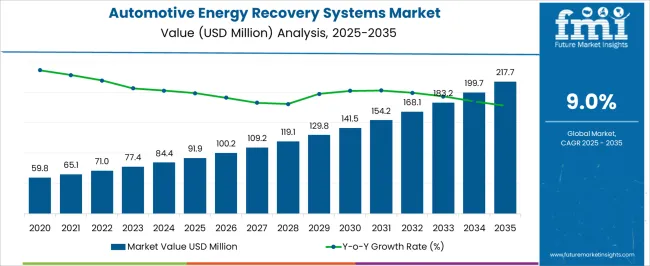
| Metric | Value |
|---|---|
| Automotive Energy Recovery Systems Market Estimated Value in (2025 E) | USD 91.9 million |
| Automotive Energy Recovery Systems Market Forecast Value in (2035 F) | USD 217.7 million |
| Forecast CAGR (2025 to 2035) | 9.0% |
The automotive energy recovery systems market is experiencing significant growth, driven by the global push for fuel efficiency, emissions reduction, and enhanced vehicle performance. Increasing regulatory pressure on automakers to meet stringent emission standards and improve overall energy utilization is encouraging the adoption of advanced energy recovery solutions. Rising demand for hybrid and electric vehicles is further stimulating investments in systems that can recapture and reuse waste energy generated during vehicle operation.
Continuous technological advancements in thermal management, turbocharging, and system integration are enhancing the efficiency and reliability of energy recovery systems. Automakers are increasingly focused on reducing fuel consumption while maintaining engine performance, creating a favorable environment for widespread adoption.
The market is also benefiting from growing awareness among consumers and fleet operators regarding environmental impact and operational cost savings As global vehicle production expands and electrification trends accelerate, the automotive energy recovery systems market is poised for sustained growth, with manufacturers prioritizing innovative solutions to maximize energy efficiency and regulatory compliance.
The automotive energy recovery systems market is segmented by vehicle type, waste heat recovery system, and geographic regions. By vehicle type, automotive energy recovery systems market is divided into Automotive Energy Recovery Systems for Hybrid Vehicles, Automotive Energy Recovery Systems for Electric Vehicles, and Automotive Energy Recovery Systems for Plug-in Hybrid Electric Vehicles. In terms of waste heat recovery system, automotive energy recovery systems market is classified into Turbocharger based Automotive Energy Recovery System and EGR based Automotive Energy Recovery System. Regionally, the automotive energy recovery systems industry is classified into North America, Latin America, Western Europe, Eastern Europe, Balkan & Baltic Countries, Russia & Belarus, Central Asia, East Asia, South Asia & Pacific, and the Middle East & Africa.
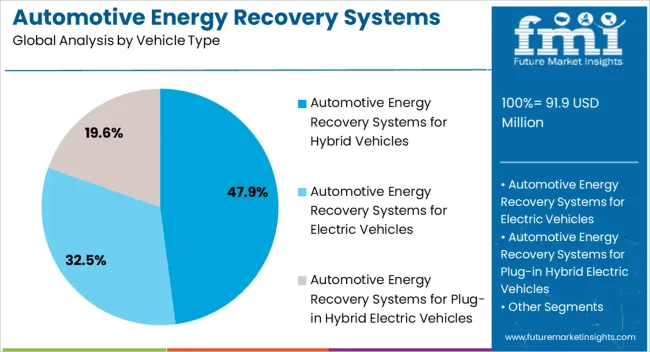
The automotive energy recovery systems for hybrid vehicles segment is projected to hold 47.9% of the market revenue share in 2025, establishing itself as the leading vehicle type category. This leadership is being driven by the increasing penetration of hybrid vehicles in both developed and emerging markets, where the integration of energy recovery systems significantly enhances fuel efficiency and reduces carbon emissions. Hybrid vehicles benefit from the ability to recapture kinetic and thermal energy during braking and engine operation, improving overall energy utilization.
The segment is supported by the growing preference for sustainable mobility solutions and government incentives promoting hybrid vehicle adoption. Advanced system integration techniques and improved energy storage solutions are enabling seamless performance without compromising driving experience or vehicle reliability.
The rising focus on reducing operational costs for commercial fleets and consumer vehicles is further reinforcing adoption As hybrid vehicle production continues to rise globally, the deployment of energy recovery systems in this segment is expected to remain a key growth driver for the automotive energy recovery systems market.
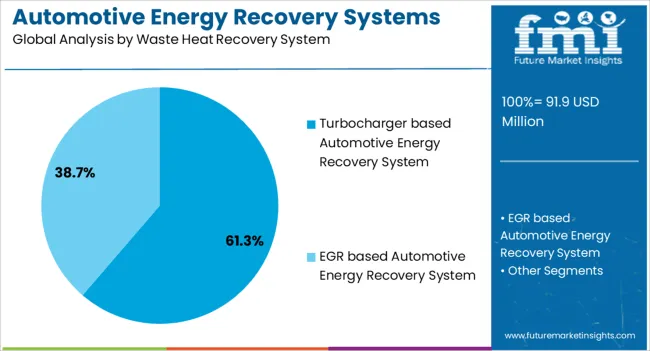
The turbocharger based automotive energy recovery system subsegment is anticipated to account for 61.3% of the market revenue share in 2025, making it the leading technology type. Its dominance is being driven by the high efficiency and performance improvements enabled through turbocharging, which allows energy from exhaust gases to be recaptured and reused to improve engine output.
The system’s ability to reduce fuel consumption and emissions in both conventional and hybrid vehicles is creating strong demand across passenger and commercial vehicle applications. Technological advancements in turbocharger design, materials, and integration with electronic control systems are improving reliability, reducing weight, and enabling higher energy recovery rates.
The subsegment is also benefiting from the increasing emphasis on lightweight and compact solutions, which are compatible with evolving vehicle designs and emission compliance requirements As automakers continue to prioritize efficiency improvements and regulatory adherence, turbocharger based energy recovery systems are expected to maintain their leadership position within the automotive energy recovery systems market over the coming years.
The escalated fuel prices in the past half-decade have created concerns for both users and manufacturers. Thus, Original Equipment Manufacturers of automotive are promoting their products by boasting the fuel-efficient quotient.
Globally, the preference of the customers is changing, these days fuel-efficient and improved performance vehicles are preferred by the customers. Due to this, there is a growing demand for the automotive energy recovery system.
Overall, developed countries like USA & Canada have implemented stringent government regulations, and this is also fueling the demand for Automotive Energy Recovery Systems.
The high production cost is a major factor restraining the growth of the global automotive energy recovery systems market. In addition, the availability of low-cost false systems is another factor expected to challenge the growth of the global automotive energy recovery systems market to a certain extent.
Asia Pacific market is likely to capture the majority share in the global automotive energy recovery systems market and is expected to continue its dominance during the forecast period. The market growth is attributed to stringent government regulations related to air pollution from vehicles, growing vehicle production, and the presence of major players operating in countries in this region.
Further, the recognition of Tesla models has made many people in China cognisant of the brake energy recovery systems, which not only help slash the energy lost during braking in vehicles but also make single-pedal mode possible.
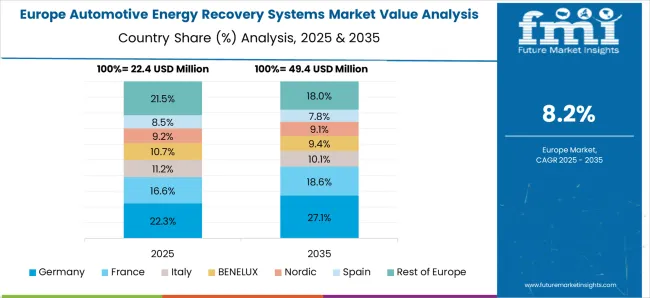
The European market is projected to record the fastest growth in terms of revenue, due to the growing adoption of the product in commercial vehicles in developing economies in this region.
France and Russia are likely to grow significantly, driven by a rise in the number of electrical vehicles & EVSE infrastructure and enhanced vehicle performance. The automotive industry observed an upward trend of hybrid cars in a process to reduce carbon emissions. Moreover, increasing adoption of innovative and advanced technology are some of the factors reinforcing the demand for energy recovery systems in the region.
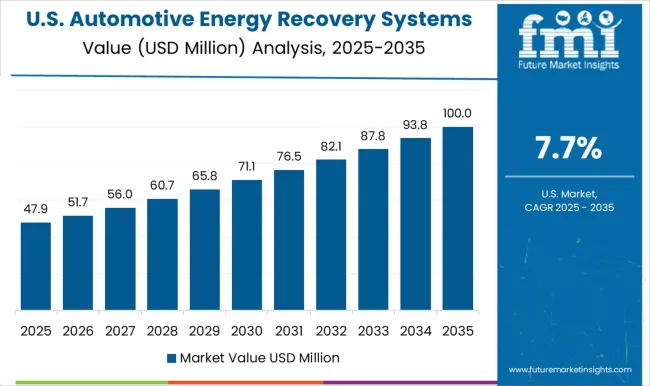
USA sales of hybrid vehicle sales jumped 76% to 801,550 vehicles last year, accounting for 5% of USA light-vehicle sales. Hence, the rising popularity of EVs is nurturing the automotive energy recovery systems market across the countrye.
Further, owing to stringent emission standards against the effects of diesel engines on health and the environment, the region witnessed upsurged demand for Automotive Energy Recovery Systems. Honda, which plans to launch its first EV for the USA market in 2025, anticipated the market to take off thanks to a slew of new model launch
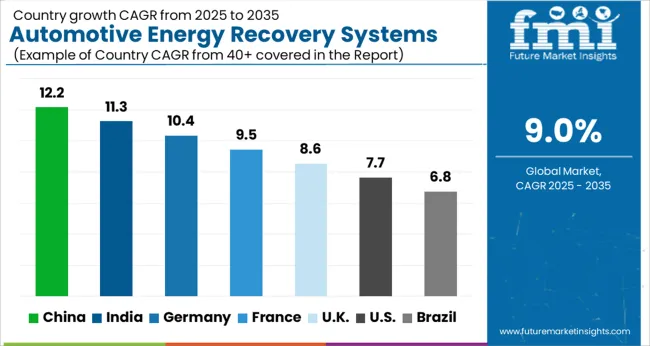
| Country | CAGR |
|---|---|
| China | 12.2% |
| India | 11.3% |
| Germany | 10.4% |
| France | 9.5% |
| UK | 8.6% |
| USA | 7.7% |
| Brazil | 6.8% |
The Automotive Energy Recovery Systems Market is expected to register a CAGR of 9.0% during the forecast period, exhibiting varied country level momentum. China leads with the highest CAGR of 12.2%, followed by India at 11.3%. Developed markets such as Germany, France, and the UK continue to expand steadily, while the USA is likely to grow at consistent rates. Brazil posts the lowest CAGR at 6.8%, yet still underscores a broadly positive trajectory for the global Automotive Energy Recovery Systems Market. In 2024, Germany held a dominant revenue in the Western Europe market and is expected to grow with a CAGR of 10.4%. The USA Automotive Energy Recovery Systems Market is estimated to be valued at USD 32.8 million in 2025 and is anticipated to reach a valuation of USD 68.6 million by 2035. Sales are projected to rise at a CAGR of 7.7% over the forecast period between 2025 and 2035. While Japan and South Korea markets are estimated to be valued at USD 4.9 million and USD 2.6 million respectively in 2025.
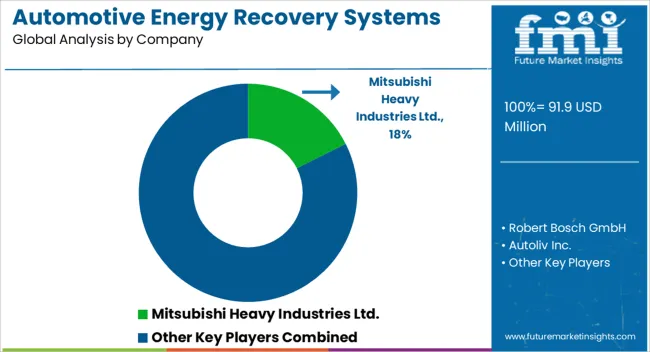
| Item | Value |
|---|---|
| Quantitative Units | USD 91.9 Million |
| Vehicle Type | Automotive Energy Recovery Systems for Hybrid Vehicles, Automotive Energy Recovery Systems for Electric Vehicles, and Automotive Energy Recovery Systems for Plug-in Hybrid Electric Vehicles |
| Waste Heat Recovery System | Turbocharger based Automotive Energy Recovery System and EGR based Automotive Energy Recovery System |
| Regions Covered | North America, Europe, Asia-Pacific, Latin America, Middle East & Africa |
| Country Covered | United States, Canada, Germany, France, United Kingdom, China, Japan, India, Brazil, South Africa |
| Key Companies Profiled | Mitsubishi Heavy Industries Ltd., Robert Bosch GmbH, Autoliv Inc., Continental AG, Honeywell International, Inc., Cummins Inc., Tenneco Inc., and Faurecia |
The global automotive energy recovery systems market is estimated to be valued at USD 91.9 million in 2025.
The market size for the automotive energy recovery systems market is projected to reach USD 217.7 million by 2035.
The automotive energy recovery systems market is expected to grow at a 9.0% CAGR between 2025 and 2035.
The key product types in automotive energy recovery systems market are automotive energy recovery systems for hybrid vehicles, automotive energy recovery systems for electric vehicles and automotive energy recovery systems for plug-in hybrid electric vehicles.
In terms of waste heat recovery system, turbocharger based automotive energy recovery system segment to command 61.3% share in the automotive energy recovery systems market in 2025.






Our Research Products

The "Full Research Suite" delivers actionable market intel, deep dives on markets or technologies, so clients act faster, cut risk, and unlock growth.

The Leaderboard benchmarks and ranks top vendors, classifying them as Established Leaders, Leading Challengers, or Disruptors & Challengers.

Locates where complements amplify value and substitutes erode it, forecasting net impact by horizon

We deliver granular, decision-grade intel: market sizing, 5-year forecasts, pricing, adoption, usage, revenue, and operational KPIs—plus competitor tracking, regulation, and value chains—across 60 countries broadly.

Spot the shifts before they hit your P&L. We track inflection points, adoption curves, pricing moves, and ecosystem plays to show where demand is heading, why it is changing, and what to do next across high-growth markets and disruptive tech

Real-time reads of user behavior. We track shifting priorities, perceptions of today’s and next-gen services, and provider experience, then pace how fast tech moves from trial to adoption, blending buyer, consumer, and channel inputs with social signals (#WhySwitch, #UX).

Partner with our analyst team to build a custom report designed around your business priorities. From analysing market trends to assessing competitors or crafting bespoke datasets, we tailor insights to your needs.
Supplier Intelligence
Discovery & Profiling
Capacity & Footprint
Performance & Risk
Compliance & Governance
Commercial Readiness
Who Supplies Whom
Scorecards & Shortlists
Playbooks & Docs
Category Intelligence
Definition & Scope
Demand & Use Cases
Cost Drivers
Market Structure
Supply Chain Map
Trade & Policy
Operating Norms
Deliverables
Buyer Intelligence
Account Basics
Spend & Scope
Procurement Model
Vendor Requirements
Terms & Policies
Entry Strategy
Pain Points & Triggers
Outputs
Pricing Analysis
Benchmarks
Trends
Should-Cost
Indexation
Landed Cost
Commercial Terms
Deliverables
Brand Analysis
Positioning & Value Prop
Share & Presence
Customer Evidence
Go-to-Market
Digital & Reputation
Compliance & Trust
KPIs & Gaps
Outputs
Full Research Suite comprises of:
Market outlook & trends analysis
Interviews & case studies
Strategic recommendations
Vendor profiles & capabilities analysis
5-year forecasts
8 regions and 60+ country-level data splits
Market segment data splits
12 months of continuous data updates
DELIVERED AS:
PDF EXCEL ONLINE
Energy Recovery Ventilator Core Market Growth – Trends & Forecast 2024-2034
Automotive Energy Storage System Market Size and Share Forecast Outlook 2025 to 2035
Automotive Energy Absorption (EA) Pads Market Size and Share Forecast Outlook 2025 to 2035
Automotive Seating Systems Market Analysis - Size, Share & Forecast 2025 to 2035
Automotive Exhaust Systems Market Trends - Growth & Forecast 2025 to 2035
Automotive Ignition Systems Market Size and Share Forecast Outlook 2025 to 2035
Starch Recovery Systems Market Outlook – Growth, Demand & Forecast 2023-2033
Solvent Recovery Systems Market Size and Share Forecast Outlook 2025 to 2035
Automotive Brake Actuation Systems Market Size and Share Forecast Outlook 2025 to 2035
Automotive Water Separation Systems Market Size and Share Forecast Outlook 2025 to 2035
Home Energy Management Systems Market Size and Share Forecast Outlook 2025 to 2035
Automotive Turbo Compounding Systems Market Growth – Trends & Forecast 2025 to 2035
Automotive Personal Navigation Systems Market Size and Share Forecast Outlook 2025 to 2035
Automotive Gesture Recognition Systems Market
Automotive Touch Screen Control Systems Market Growth - Trends & Forecast 2025 to 2035
New Energy Vehicle Electric Drive Systems Market Size and Share Forecast Outlook 2025 to 2035
Directed Energy-Based Surgical Systems Market Growth – Forecast 2025 to 2035
APAC Waste Heat Recovery Systems Market Size and Share Forecast Outlook 2025 to 2035
ADAS Market Growth - Trends & Forecast 2025 to 2035
Electronic Control Unit in Automotive Systems Market Size and Share Forecast Outlook 2025 to 2035

Thank you!
You will receive an email from our Business Development Manager. Please be sure to check your SPAM/JUNK folder too.
Chat With
MaRIA